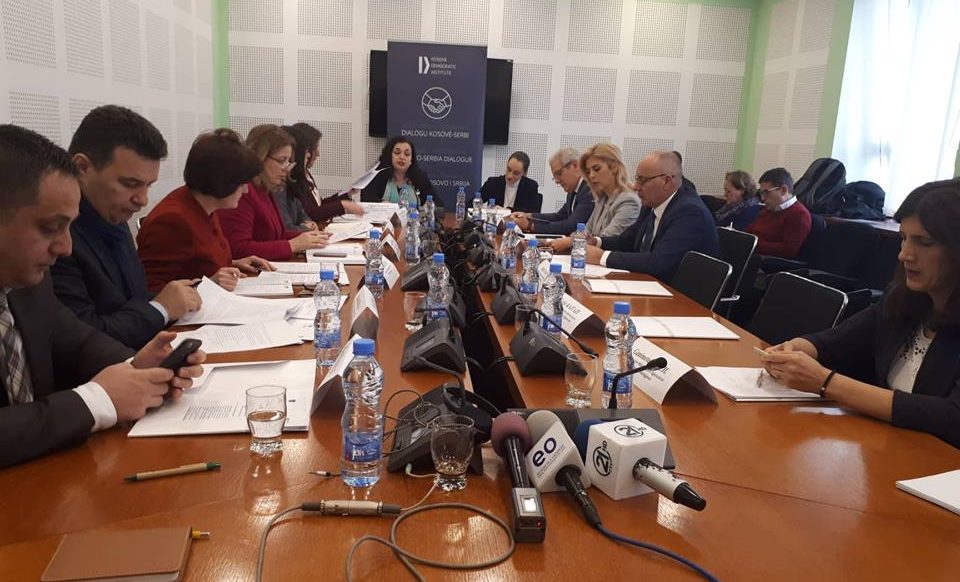


Kosova Democratic Institute (KDI), in cooperation with the Parliamentary Committee on Foreign Affairs, Diaspora and Strategic Investments held the fourth coordinating meeting of the Parliamentary Committees of the Kosovo Assembly on the monitoring and oversight role of the Assembly in the Kosovo-Serbia dialogue process.
The meeting discussed the work that parliamentary committees have developed in order to monitor the implementation of agreements arising from the process of dialogue, including the findings, achievements and challenges in the implementation of these agreements, which are also evidenced in the Government report of June this year on this issue.
Chairwoman of the Foreign Affairs Committee, Vjosa Osmani, at the beginning of the meeting demanded that the work of 2019 on the issue of dialogue be given importance, including various supervisory activities of this process. It submitted a draft of agreements that should be monitored by the respective commissions, based on their scope. According to her, from the evaluation that the Committee on Foreign Affairs has made to the Government Report on Challenges and Achievements in the Implementation of Brussels Agreements, it appears that Serbia has not implemented nearly two-thirds of the agreements reached so far, unlike the Kosovar side, which has shown willingness and dedication, implementing almost all the agreements.
Jeta Krasniqi from the Kosova Democratic Institute (KDI) explained that KDI for more than two years has offered constant support to the Kosovo Assembly, committees and parliamentary groups regarding the Kosovo-Serbia dialogue process. Appreciating the work parliamentary committees have made during 2018, she expressed that parliamentary committees could play a much more effective and proactive role in exercising their oversight function in relation to the dialogue process.
During the meeting, MP Muharrem Nitaj also raised the issue of new developments in the dialogue, namely on the new Kosovo Assembly resolution on the final stage of the dialogue, which foresees, inter alia, the establishment of the Committee for the Supervision of Dialogue, adding that the future of the agreements already reached within this process remains to be seen. On the other hand, MP Driton Selmanaj criticized this approach, evaluating it as unlawful, as the new resolution attempts to exclude the oversight activity of the parliamentary committees, which are foreseen in the Rules of Procedure of the Kosovo Assembly.
Following, the chairmens of parliamentary committees reported on the oversight activities that respective committees have undertaken since the last coordinating meeting on the dialogue process. Some of the agreements that were reported by the parliamentary committees were the Justice Agreement, the Energy Agreement, the Agreement for the Establishment of the Association of Serbian Majority Municipalities, the Agreement for the Revitalization of the River Iber Bridge, the Energy Agreement, the Telecommunications Agreement, The North Development Fund, the Free Movement
Agreement, the Agreement on Integrated Border Management (IBM), the Agreement on Customs Stamps, the Agreement on Pharmaceutical Products, the Agreement on the Disbandment of the so-called “Civil Protection”, the Diploma Recognition Agreement, the Agreement for Cadastral and Civil Registers, and other agreements.
All committees identified numerous challenges in implementing certain agreements, mainly due to obstructions and unwillingness for implementation by Serbia. It was stated that one of the agreements that is being implemented at satisfactory levels is that of pharmaceutical products and equipment, within which are registered 123 Serbian pharmaceutical products, which have accepted Kosovo’s applicable laws.
During the discussions was also mentioned the issue of KOSTT’s membership in ENTSO-E, which was said to have been deliberately failed by the Kosovar side, as the proposed agreement by ENTSO-E foresaw the deployment of Kosovo’s energy boundary to Lake Ujman, leaving the latter under the management and control of the state of Serbia.
The chairmen and chairmen of the parliamentary committees agreed that the committees should submit a written report on the monitoring of the implementation of certain agreements in the dialogue process, and they should be discussed in this format of the meeting. Likewise, parliamentary committees agreed to request written reports from the institutions and other agencies responsible for implementing the agreements, and the same should be included in the summary report of this meeting in order to increase co-ordination among the parliamentary committees on monitoring the dialogue process.
The meeting also highlighted the need for increased care, especially in the integration of persons with criminal background in the justice system and the Kosovo Police, because of the suspicions that they were involved in crimes committed during the war period in Kosovo.
The parliamentary committees agreed that during the next year, depending on the new developments within the dialogue process, to continue their co-operation, by holding joint meetings, in cases when they are discussed issues that are related to the dialogue Kosovo-Serbia.
The meetings between the parliamentary committees aim to provide a platform for discussion, coordination and agreement between the committees on their role in the Kosovo – Serbia dialogue process, mutual cooperation in monitoring, overseeing, participation and advancing the transparency of this process based on the resolutions of the Kosovo Assembly.
This activity was developed within the project “European Perspective – Building a National Consensus on the Normalization of Relations with Serbia” supported by the Swiss Embassy in Pristina and the Memorandum of Understanding with the Kosovo Assembly.